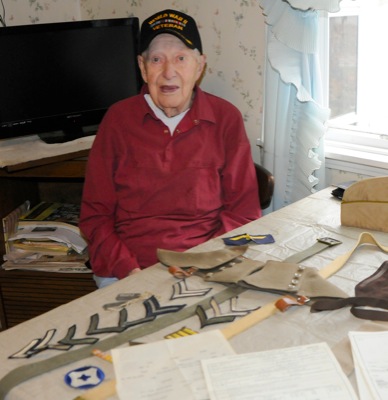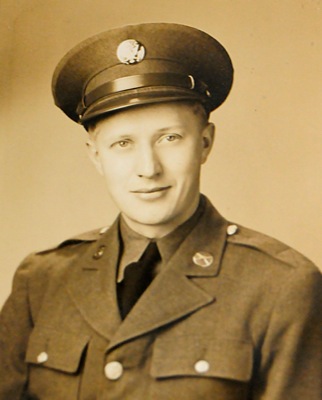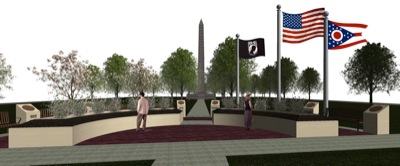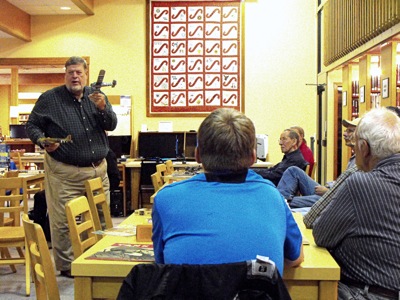Wednesday, November 11th, 2015
Area vet's war memories linger
Veteran's Day
By William Kincaid

Photo by William Kincaid/The Daily Standard
Paul Meeds of Celina recalls his time in the South Pacific during World War II, when he saw heavy action carrying artillery shells to the front lines of battles for control of various islands. He also guarded German prisoners of war in the United States.
CELINA - Paul Meeds was a 24-year-old young man, working on the family farm in Versailles, when World War II took him across the globe to the heart of deadly battle in the South Pacific.
Now 98, Meeds, the oldest of six siblings born to Elva and Mamie Meeds, recalled, with help from granddaughter Melissa Gehm, memories from his involvement in the Allied forces Pacific Campaign, which found him stationed in Australia, New Zealand, Fiji, Guadalcanal and New Georgia. Memories of the dense jungles, heavy rains and disabling dysentery, suicidal Japanese snipers hiding in trees, enemy airplanes circling the islands, and a Japanese submarine getting torpedoed by a mine sweeper on his way back home to the United States loom large in his mind.
Nearly a century old, Meeds is lucid, but his hearing is significantly compromised from his wartime experiences.
"He never talks about himself," Gehm said. "He's very humble about things. He doesn't bring it up unless spoken to about it but he'll freely share."
During his time in the Army, Pfc. Meeds served as an ammunition handler, rifleman and military policeman watching over German prisoners of war in an Army stockade in South Carolina. He began active service Oct. 20, 1941, and was honorably discharged on Oct. 3, 1945, at Separation Point Fort Jackson in South Carolina.
In the South Pacific he took part in campaigns to take control of key islands.
"He was basically sent out first in infantry to prepare for the other ... planes to land. They shipped them first and they lived in tents and jungles and built the runways and got things ready for the bigger troops to come in," Gehm said. "He was cutting down the trees in Fiji."
"The whole outfit came later," Meeds said. "Sixty of us had to get everything ready. I was one of them."
"He moved around a lot to prepare. He never really stayed at a major station long," she continued.
Meeds spoke of American forces trying to land on the island of New Georgia.
"They tried to sneak in during the cover of the darkness at night," Gehm said.
"We was getting off the ship there, I was hanging down on the side of the boat on a rope ladder. I was getting off ... and the Japs kept firing on us," he said. "My sergeant from St. Marys got killed and they hollered for me to get back in."
He was in a demolition unit on the island of New Georgia, he said.
"I was carrying shells up the front line," he said. "I had them hanging around over me."
He faced intense gunfire, including from Japanese suicide shooters in the trees, but was never hit.
"They would volunteer and they called them the suicide shooters because they would have to go into the jungle where they knew that they (Americans) were stationed and they would put themselves out there to be snipers," Gehm explained.
Meeds remembers a "whole mob of" Japanese soldiers coming down from a mountain, screaming.
"It was only a few of them but, boy, it sounded like there were hundreds of them," Meeds said.
Asked if he was scared while carrying out assignments, Meeds said, "man, yes."
To finish his service, Meeds was assigned to a fort in South Carolina, serving as a military policeman guarding German prisoners of war. He did watch- tower work and carried a pistol, carbine and rifle, according to Army records.
"He had a wallet that the prisoners of war made him out of the snakes that they had killed in the ditches," Gehm said. "They were rattlesnake skins. He said there were 17 different snakes that they had made (into) a wallet for him."
For his service during the war, Meeds was awarded the Asiatic Pacific Ribbon with two Bronze Battle Stars, the American Defense Ribbon and a Good Conduct Ribbon.
Meeds entered the war as a single young man. But that changed when he returned home. An acquaintance from back home during the war helped arrange written correspondence between Meeds and a young Celina girl named Mary Hanna, of whom he was aware but not familiar.
Upon his return, he traveled to her home.
"I pulled in there, here she comes carrying a load of firewood to burn. She never saw me before, and there I caught her carrying a load of wood - I knew she was a farmgirl then," he said with a smile.
A year later, he married Mary and moved to Celina. Gehm teared up at the recollection of her grandfather meeting her grandmother for the first time.
The Meeds both worked at Mersman Tables and had one child, Margie Gehm, Melissa's mother.

Submitted Photo
Meeds was honorably discharged from the military on Oct. 3, 1945. He was awarded the Asiatic Pacific Ribbon with two Bronze Battle Stars, the American Defense Ribbon and a Good Conduct Ribbon.



